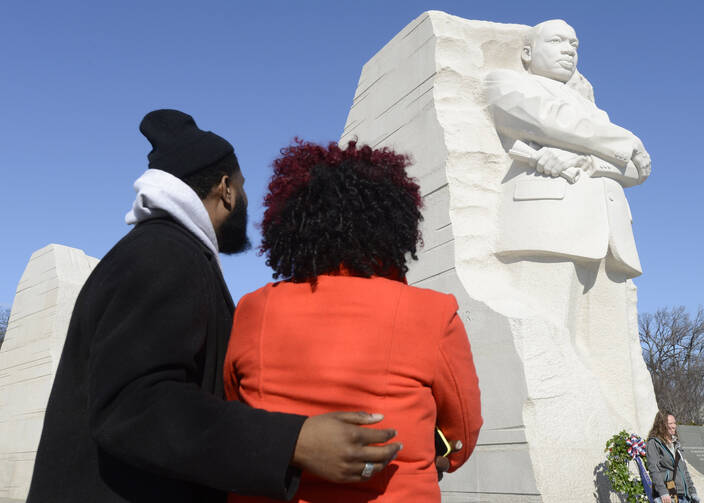I spent Easter weekend at Georgetown, having acquired a great affection for the university and the city of Washington during the two years I spent there while working for my PhD at George Washington University and, later, when I wrote the biography of Eric Sevareid. Saturday I rented a bike to zoom along the Potomac Park, where I stumbled upon, to my delight, the Martin Luther King Memorial.
The statue looms enormous, more overwhelming than depicted, a crowd of maybe 100 gathered in front or moving through the three accompanying white mini-mountains shooting up around it. Two marble walls, each engraved with seven thrilling quotations, swoop up to King from either side. My favorite, from his 1964 Nobel Prize acceptance speech: “I have the audacity to believe that peoples everywhere can have three meals a day for their bodies, education and culture for their minds, and dignity, equality, and freedom for their spirits.”
“The audacity to believe!” And to act on that belief, no matter what the opposition. Isn’t that what sainthood is about? But saints are “holy.” Was King holy? Holiness is not a selfish preoccupation with the status of one’s soul (Harper Encyclopedia of Catholicism, 617). Holiness is one’s response to God’s love, which can take many forms —humility, love of neighbor or the promotion of a just social order. Surely King loved his fellow men and women enough to risk his life every time he stood up in public.
The media have been filled recently with the controversy over the combined canonizations of Pope John XXIII and Pope John Paul II—the differences in their style, accomplishments, concept of the church and the exceptions to the rules made for both: Pope Benedict XVI started the canonization process for John Paul immediately, rather than wait the five required years, and Pope Francis, informed that John Paul was ready to go, moved John up front, although he lacked one of two required miracles. Furthermore, Pope John XXIII was much loved for his courage to initiate Vatican II and while John Paul II had a strong following for his “charism,” and opposition to the Soviet Union, while his opposition to Liberation Theology and his toleration of Marcial Maciel Degollado, founder of the Legionaries of Christ and a corrupt pedophile, disappointed many. (The best article on this is John Wilkins’ “The Odd Couple,” in Commonweal, 4/11).
The requirements for sainthood seem fluid. Basically it’s holiness plus two miracles, achieved through God’s intervention, to prove—apparently—that the proposed saint is in heaven. John Henry Newman, a convert once acclaimed for his brilliant defense of the church, had no miracles, and his corpse, far from being miraculously preserved, as is attributed to some saints, was just a handful of dust. The process is also very costly. Dorothy Day would not approve of her own cause because the money involved in making saints, she said, should go to the poor. Rev. Peter Gumpel, S.J., who administers Jesuit saint candidacies, told the Washington Post (4/26), we all believe in miracles, but, “the question is simply and purely, should we require the confirmation of miracles for saints?” My answer is, No.
I also suggest we have a moratorium on “making” saints for a while, until we have a common understanding of what we are trying to do. Ideally saints serve as teachers, men and women who by their everyday lives demonstrate “holiness.” By which we mean that they are so overwhelmed by God’s love for us that they respond not by preoccupation with their own perfection, but by love demonstrated in love of neighbor and promotion of social justice. To be the founder of a religious institution or movement, as Maciel demonstrates, is not enough; nor is it enough to be the center of a popular devotion. See historian Stafford Poole, C.M.’s article in Commonweal (6/14/02) on the alleged witness to the Virgin Mary’s appearance at Guadalupe: “Did Juan Diego Exist?” His answer is that the evidence says no.
One of my favorite theology textbooks when I was teaching was Robert Ellsberg’s All Saints, Daily Reflections on Saints, Prophets, and Witnesses for Our Time (Crossroad 1999), short essays on a saint for every day, not all canonized and many non-Catholics, but each an admirable role model, courageous man or woman with whom we can identify, including: Galileo, Pedro Arrupe, S.J., Karl Rahner, S.J., Bach, Dietrich Bonhoeffer, Teihard de Chardin, S.J., Henry David Thoreau, John Howard Griffin, Albert Schweitzer, Albert Camus, Thomas Merton, Newman and King. Would it enhance their stature to be canonized? I doubt it. We can still pray to them as they are.
I think we can pray to all of these, just as we pray to—not for—our own departed loved ones and personal heroes. Frankly I do not imagine Heaven as a medieval royal court where God sits on a throne and we grovel before Him or plead with saints to intercede. Jesus told us that God is our Father, and we have always spoken to our fathers face to face. I have prayed for help to my own late brother David when I needed advice and to Robert F. Drinan, S.J., when I faced an obstacle while I was writing his biography. I didn’t ask for a miracle, just for some help. And help came.








